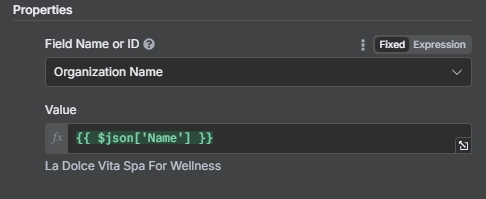Hi everyone,
I’m encountering a persistent validation issue when creating Leads via the ERPNext REST API, specifically using n8n as the integration tool. My ERPNext instance is self-hosted using the standard Coolify template.
Environment:
-
ERPNext Version: v15.58.1 (Image tag frappe/erpnext:v15.58.1 pulled around April 17, 2025)
-
Deployment: Self-hosted via Coolify (Link to template)
-
Integration Tool: n8n (using the standard ERPNext node - Resource: Document, Operation: Create, DocType: Lead)
The Problem:
When attempting to create a new Lead via the API and providing the organization’s name mapped to the standard company_name field, I consistently receive a 417 Validation Error:
{
"exception": "frappe.exceptions.ValidationError: A Lead requires either a person's name or an organization's name",
"exc_type": "ValidationError",
"_exc_source": "erpnext (app)",
"exc": "[\"Traceback (... traceback details pointing to lead.py -> set_lead_name function ... )\"]",
"_server_messages": "[...]"
}

This error occurs even though the company_name field (the standard field for the organization’s name) is being correctly mapped and sent with a valid string value in the API payload.
Troubleshooting Steps & Findings:
-
company_name Only: Sending the API request with only company_name (and other necessary/custom fields like status, custom_category, etc.) consistently fails with the 417 error above.
-
Adding first_name: If I add the standard first_name field to the API payload in addition to company_name, the API call succeeds (returns a 200 OK status).
- This works even if the value provided for first_name is just a placeholder string (e.g., “Contact” or “Lead”).
- Side Effect: Providing first_name also triggers ERPNext’s standard behavior of automatically creating a linked Contact document, which is understandable but highlights that the first_name field is being processed.
Core Issue/Question:
The validation error message suggests that either a person’s name (like first_name) or an organization’s name (company_name) is sufficient. However, based on API testing with v15.58.1, it seems that providing company_name alone is not enough to satisfy the validation check performed during the API request handling (set_lead_name function). The presence of a non-empty first_name appears to be mandatory via the API to prevent the 417 error, even if company_name is validly provided.
Has anyone else encountered this specific behavior when creating Leads via the API, particularly on v15? Is this a known issue with certain ERPNext versions or API handling? Is there a configuration setting or a different approach to satisfy this validation rule strictly with company_name via the API, without needing to send a potentially redundant first_name?
Any insights or suggestions would be greatly appreciated!
Thanks!